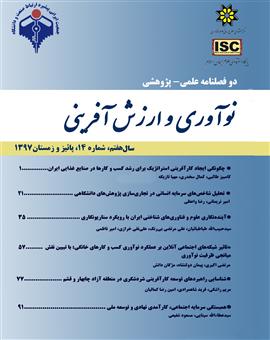همبستگی سرمایه اجتماعی، کارآمدی نهادی و توسعه ملی
محورهای موضوعی : عمومی
سیدعطاءالله سینائی
1
,
مسعود شفیعی
2
![]()
1 - دانشگاه پیام نور
2 -
کلید واژه: سرمایه اجتماعی, کارآمدی نهادی, توسعه ملی, همبستگی, هم افزایی,
چکیده مقاله :
فرایند پیوستۀ توسعه مهمترین ذهن مشغولی جوامع بشری و تعیین کنندۀ میزان تفاوت کشورهاست. بنابر این پرسش مهمی که در دنیای کنونی رد و بدل می شود این است که چرا و چگونه برخی کشورها به سطح بالاتری از شاخص های توسعه دست یافته اند و برخی دیگر در پایین جدول قرار دارند؟ از این زاویه کاویدن عوامل و ابعاد توسعه و طرح پرسش ها و فرضیات در این خصوص روش رایجی برای کشف و گشایش مسیرهای توسعۀ جوامع است. هدف کلی در این پژوهش بررسی سرمایه اجتماعی، رابطۀ آن با شکل گیری کارآمدی نهادی و سپس با نوسانات توسعۀ ملی است. پژوهش به تأثیر این ظرفیت های دو گانه، پیاپی و پیشنیاز بر نوسانات حرکت در مسیر توسعۀ ملی می پردازد. بازبینی مسیر طی شده و نوسانات نشان می دهد که رابطۀ میان این سه عامل برخوردار از یک وضعیت هم افزا (synergy)است. چارچوب نظری این پژوهش، تلفیقی از تئوریهای سرمایه اجتماعی، نهادگرایی و توسعه؛ و نظریات اندیشمندانی چون پاتنام، فوکویاما، هانتینگتون، نورث، شومپیتر، میردال و تودارو، در ارتباط با متغیرهای درگیر در شکل گیری موضوع پژوهش است. فرضیه اصلی پژوهش این است که رابطۀ همبستگی مثبتی میان سه متغیر سرمایه اجتماعی، کارآمدی نهادی و توسعۀ ملی وجود دارد. این پژوهش از نظر هدف بنیادی و از نظر روش کتابخانه ای، اسنادی و اکتشافی است.
The ongoing development process is the most important mindset of human societies and determines the degree of difference between countries. So the important question that is going on in the current world is how and why some countries have reached a higher level of development indicators, while others are at the bottom of the table? From this angle, the factors and dimensions of development and the formulation of questions and assumptions in this regard are a common method for discovering and opening up the development paths of societies. The general objective of this research is to examine social capital, its relationship with the formation of institutional efficiency and then with the fluctuations of national development. The research studies the impact of these two-way, successive and pre-requisite volatilities on the path to national development. Reviewing the path and fluctuations show that the relationship between these three factors has a synergy. The theoretical framework of this research is a combination of theories of social capital, institutionalism and development; and thinkers such as Putnam, Fukuyama, Huntington, North, Schumpeter, Mirdal, and Todaro, in relation to the variables involved in the formation of the subject of research. The main hypothesis of the research is that there is a positive correlation between the three variables of social capital, institutional efficiency, and national development. This research is a fundamental objective and in terms of library, documentary and exploratory method.
